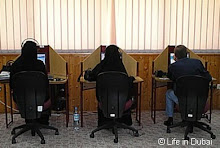There are two stories in Khaleej Times today demonstrating again the accuracy of the survey that said UAE is tops in providing luxury to expats.
One from Abu Dhabi is on official labourer accommodation and says that many companies are ignoring the basic standards required by law.
What a surprise.
Of the 100-plus accommodation sites inspected "many" were found not to be complying with the standards.
All the companies are required to do is basic stuff. To provide accommodation which has good ventilation and adequate sunlight, with floors high enough off the ground to avoid being flooded, and have electricity and water. Rooms must be adequate to accommodate the maximum allowed of six people. They must have a minimum ceiling height of 2.28m, be equipped with beds, elevated from the ground, plus wardrobes. There must be at least one toilet and wash basin for every 10 workers, the toilets equipped with exhaust fans and be located far from the kitchens.
It's just basic isn't it, nothing draconian.
Yet "many" are not even providing this basic level, which demonstrates yet again that laws are ignored unless they're rigorously enforced.
The other story is from Umm Al Quwain and is about unofficial accommodation. Like the other emirates, UAQ does not allow 'bachelors' to live near families.
The story begins: The Umm Al Quwain Municipality has disconnected water supply to 25 houses in Old Al Salama to punish 2,000 bachelors living in a locality designated for families.
Twenty-five houses, two thousand people?
I make that an average of eighty people living in each house. Even if they're large enough to have ten rooms that's eight to a room.
In Old Al Salama, up to 95 bachelors lived in one house. The houses were partitioned and each room was packed with up to eight workers. Landlords of these houses have flouted the housing committee’s regulations.
Both landlords and tenants apparently ignored warnings, so the Municipality has decided to force the issue. The tenants are obviously being exploited and they're now being forced out of their accommodation by a lack of water.
I wonder what action is being taken against the landlords. Are services being cut off to their houses? Are fines being issued to them? Or do you think it's only the 'bachelors' who'll be punished and the exploiters will simply get away with it?
Here are the stories:
Labourer accommodation.
Bachelors denied water.
Subscribe to:
Post Comments (Atom)






3 comments:
*shaking head* Landlords are rarely punished for anything. Funny how that works.
Actually in many cases the landlords have no idea what's going on as a separate company overlooks the property. They only find out about these things once the municipality has taken said company AND them to court.
I remember when my father was finally contacted by one of the tenants of one of his Villas that they had been without AC for 2 weeks, and that the prop. management co. had not only not done anything, but refused to give them his number claiming it was "against the law"
It isnt, and that company was fired (Since they were the reason my father was also named in the suit,) and the ACs were fixed or REPLACED on WARRANTY within 3 days. See, it didnt even COST the prop. management company anything. Its the mentality, it isnt their house, and it isnt them living there. They collect their fee every year and that was that. As a land lord, we assumed that they were actually MANAGING the property. Silly us.
After that we made sure that all tenants had one of our numbers (my father has 4 sons above 21, each house has one of our numbers)
A company wants to make money. and if that means breaking the law, they do it. usually through connections to a low or med level person in the municipality.
Lets put it this way, a Jordanian making 10K a month can be bought, hell, a friend of mine bribed an inspector not 3 months ago. He was in fact Jordanian. (Actually, both are)
What is needed are highly trained, qualified, and paid people who inspect. An Emarati making 30K isnt going to take a bribe. 1. he is paid enough, and 2. he has his family name to think about. If something bad were to happen, where is he going to go? a foreigner can leave the country if something really bad happens, where is the Emarati going to go?
2nd you need such people to actually have some sort of authority. As you see, the municipality inspectors dont have much authority. They check, and issue a report. What the higher ups do with the report is limited to what that single agency can do.
I remember when the Imam of the mosque next to my house wanted to put up a gate so that cars wouldnt park RIGHT infront of the mosque.
He needeed clearances from the Police, the CID (a special clearance aside from the general police clearance) The Municipality, the city landscaping authority (Mathhar al madeena) the water and power authority (To make sure the metal rods going into the grounds werent hitting anything and finally from the awqaf themselves.
It too 2 months. Why? Hardly anyone from one agency talks to the other, and very few people in each agency actually have any real authority.
All I can say is, it's MUCH better than 10 years ago, and MUCH MUCH better than 20.
ABIT I agree to some extent - but at the end of the day the owner has to be responsible for his own investments.
I have investment properties overseas, managed by agents. But I know exactly how much rent is coming in, who the tenants are, I inspect the properties as regularly as I can. The tenants have my contact details as well as the agent contacts.
I totally agree with your comments about too much bureaucracy and the fact that things are improving dramatically.
Post a Comment